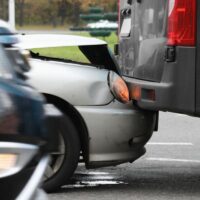Who Is Liable in a Rear-End Collision?

Rear-end collisions are the most common type of car accidents, and although not always serious, they often result in significant property damage and can cause a range of injuries from soft tissue strains and sprains to more severe injuries involving nerve damage, ruptured discs, facial lacerations, and more. While determining liability in a rear-end crash is fairly straightforward in many instances, some cases can involve complex legal issues and factual questions that complicate the matter. Below we take a closer look at rear-end collisions and the questions surrounding liability and fault that can arise. For help after a rear-end collision or other crash injury in Philadelphia, contact Benedum Law to speak with an experienced and successful Chestnut Hill car accident lawyer.
Common Causes of Rear-End Collisions
Rear-end collisions often occur due to:
-
Distracted Driving: The rear driver might be distracted by their phone, navigation system, or other distractions, leading to delayed reactions.
-
Tailgating: Following too closely behind another vehicle reduces the time and space needed to react to sudden stops.
-
Speeding: Higher speeds increase stopping distances, making it harder to avoid collisions.
-
Weather Conditions: Slippery roads from rain, snow, or ice can lead to loss of control and rear-end crashes. The basic speed law and other legal principles require drivers to adapt their speed and driving habits to the current conditions, regardless of what the posted speed limit says.
-
Brake Failure: Mechanical issues such as brake failure can prevent the rear vehicle from stopping in time. Drivers are expected to maintain their vehicles in good working order, including performing brake maintenance as needed.
General Rule of Liability in Rear-End Collisions
In most rear-end collision cases, the driver of the rear vehicle is presumed to be at fault. This presumption is based on the notion that all drivers are expected to maintain a safe following distance to avoid collisions if the car in front suddenly stops. Pennsylvania law supports this general rule, making it relatively easier for the lead vehicle driver to claim compensation for damages and injuries.
Exceptions to the General Rule
While the rear driver is typically at fault, there are many exceptions where the lead driver or another party may share or bear full responsibility.
Lead Driver’s Actions
-
Sudden and Unjustified Stops: If the lead driver makes an abrupt stop without a valid reason, they may be partially or wholly liable for the accident.
-
Reverse Gear Collisions: If the lead vehicle suddenly reverses into the rear vehicle, the lead driver is likely to be at fault.
-
Brake Lights Malfunction: If the lead vehicle’s brake lights are not functioning, the rear driver may not be able to anticipate a stop, shifting some liability to the lead driver.
Third-Party Liability
-
Road Hazards and Conditions: Poorly maintained roads, lack of proper signage, or debris on the roadway can contribute to accidents. In such cases, government entities or construction companies may share liability.
-
Vehicle Defects: If a vehicle defect, such as brake failure or tire blowout, caused the collision, the car manufacturer or maintenance provider might be held accountable.
Proving Liability in a Rear-End Collision
Establishing liability requires thorough investigation and evidence collection. Police reports provide an official account of the incident and may include citations issued to the rear driver. In addition, eyewitnesses can offer valuable insights into the events leading up to the collision. Video evidence, which can come from traffic cameras, security footage, or dashcam video, can help show the actions of both drivers before the accident. In certain cases, professionals like accident reconstruction experts can analyze the scene and vehicle damage to determine how the collision occurred.
Having a skilled personal injury attorney working for you is crucial in proving liability and recovering an appropriate amount of compensation in rear-end collision claims. At Benedum Law, our team works to gather all necessary evidence to build a strong case and analyzes all factors to identify responsible parties. We handle communications and negotiations with insurance companies to relieve you of this stress and ensure fair compensation through our legal expertise and experience handling car accident claims. If necessary, we are prepared to litigate and go to court to achieve the best outcome for our clients.
Contact Benedum Law After a Rear-end Collision in Philadelphia
While the rear driver is usually presumed liable in rear-end collisions, various factors can influence liability determinations. Understanding these nuances is essential for accident victims seeking justice and compensation. If you or a loved one has been involved in a rear-end collision in Philadelphia, contact Benedum Law for a free consultation. Our dedicated team is here to help you navigate the legal process and secure the compensation you deserve. Call us today at 215-529-7848 to discuss your case and learn more about your legal options.